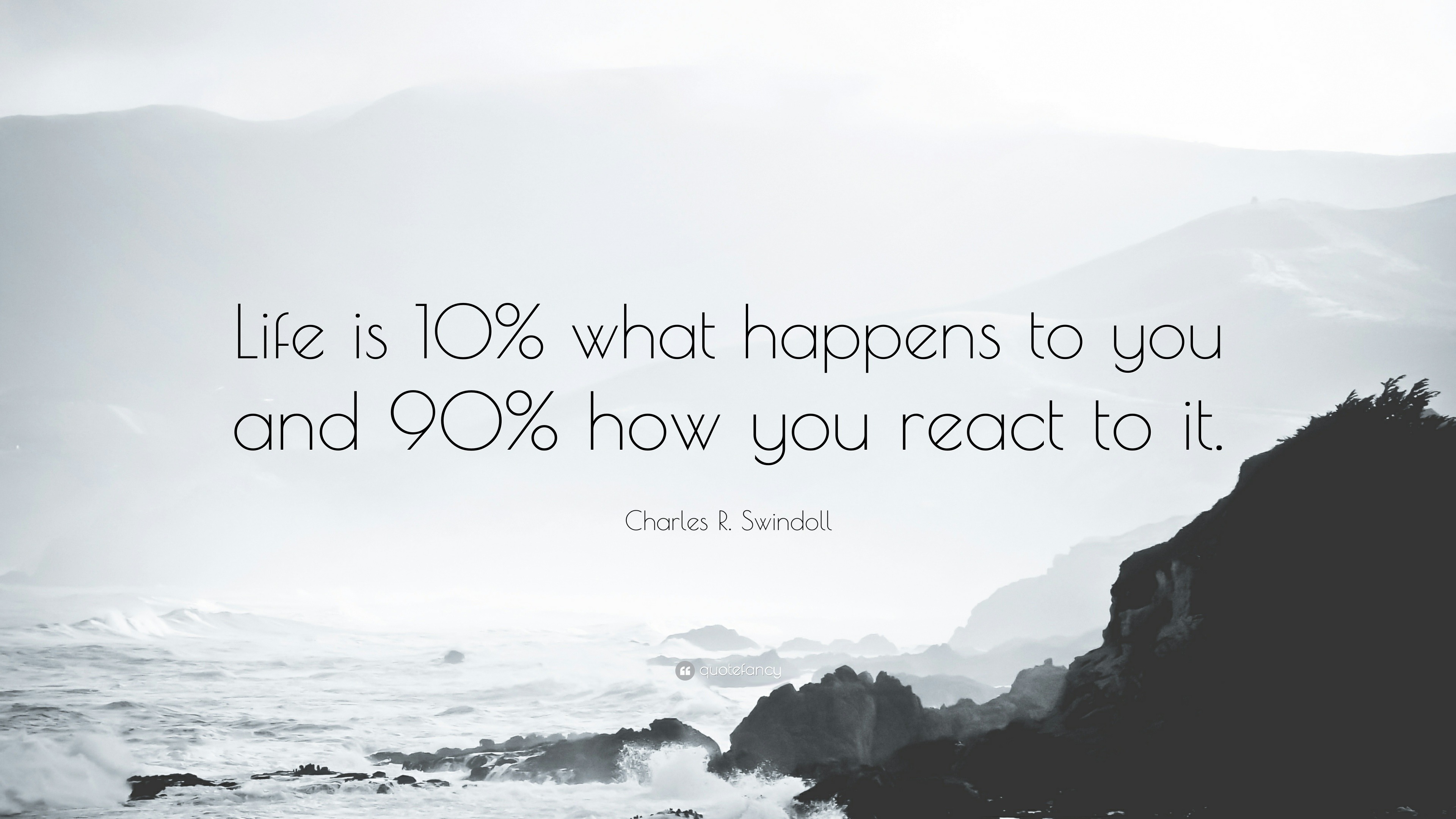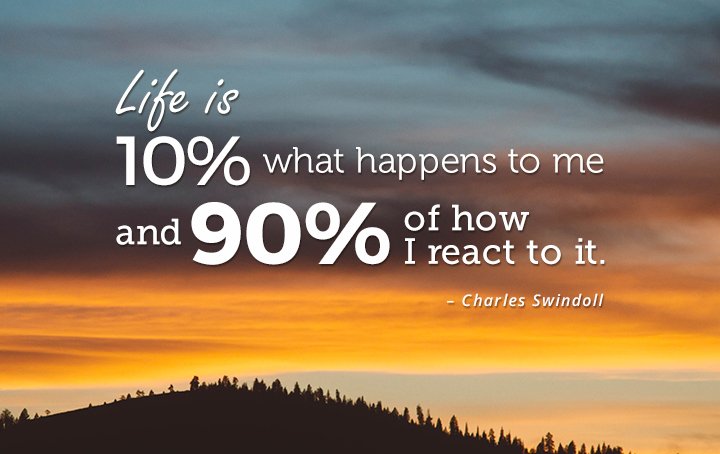Understanding the concept: Life is 10% what happens to me and 90% how I react to it
Life is a series of ups and downs, filled with unexpected events and challenges. But how we perceive and respond to these situations ultimately determines our overall happiness and success. The idea that “life is 10% what happens to me and 90% how I react to it” emphasizes the importance of our mindset and attitude in shaping our experiences. It highlights the notion that we have control over our reactions and the power to choose how we interpret and respond to the circumstances we encounter.
This post contains Amazon affiliate links, meaning I may earn a small commission if you purchase through my links, at no extra cost to you. Note: We aim to provide accurate product links, but some may occasionally expire or become unavailable. If this happens, please search directly on Amazon for the product or a suitable alternative.
The power of mindset in shaping our experiences
Our mindset plays a crucial role in how we navigate through life. A positive and resilient mindset allows us to see setbacks as opportunities for growth, embrace change, and find solutions to challenges. On the other hand, having a negative or defeatist mindset can lead to a downward spiral of pessimism and despair.
By adopting a growth mindset and focusing on our reactions rather than solely on external events, we empower ourselves to take control of our lives. We can develop resilience, adaptability, and a proactive approach to challenges. This shift in perspective allows us to view setbacks as temporary obstacles rather than insurmountable barriers, and empowers us to find opportunities for growth and success.
Recognizing that life is 10% what happens to us and 90% how we react to it is a powerful reminder of the control we have over our own experiences. By cultivating a positive mindset and choosing how we respond to life’s challenges, we can effectively shape our own destinies and create a fulfilling and meaningful life.

II. The importance of perspective
How our perspective influences our reactions
Perspective plays a crucial role in how we react to the events and situations that occur in our lives. It is not always about what happens to us, but rather, how we perceive and interpret those events. Here are a few ways in which our perspective influences our reactions:
1. Positive vs. Negative: A positive perspective allows us to see the silver lining in difficult situations and find opportunities for growth and learning. On the other hand, a negative perspective can magnify problems and make them seem insurmountable.
2. Resilience: Having a resilient perspective helps us bounce back from adversity and setbacks. It enables us to see setbacks as temporary and find ways to overcome them.
3. Emotional well-being: Having a positive perspective can improve our overall emotional well-being. It allows us to focus on the positive aspects of our lives and maintain a more optimistic outlook.
Cognitive reframing techniques to shift perspective
Sometimes, it can be challenging to change our perspective, especially when faced with difficult situations. However, there are techniques that can help us shift our perspective and react in a more positive and constructive way. Here are a few cognitive reframing techniques to consider:
1. Challenge negative thoughts: When faced with negative thoughts, challenge them by asking yourself if they are based on facts or if they are simply assumptions or interpretations.
2. Focus on the positive: Shift your focus from the negative aspects of a situation to the positive ones. Look for the lessons and opportunities for growth.
3. Practice gratitude: Cultivate a sense of gratitude by focusing on the things you are grateful for in your life. This can help to shift your perspective from negative to positive.
4. Seek different perspectives: Consider seeking input from others or looking at a situation from a different angle. This can help broaden your perspective and open up new possibilities.
5. Practice self-compassion: Treat yourself with kindness and understanding. Remember that everyone makes mistakes and faces challenges. Be gentle with yourself and shift your perspective towards self-acceptance and self-love.
By shifting our perspective, we can change how we react to the situations that come our way. It is within our power to choose how we interpret and respond to events, and this can have a significant impact on our overall happiness and well-being.
III. Building resilience
Developing resilience to handle life’s challenges
Building resilience is essential in navigating through life’s ups and downs. Here are some tips to help develop resilience:
1. Embrace change: Change is a natural part of life, and instead of fearing it, learn to embrace and adapt to new circumstances.
2. Maintain a positive mindset: Cultivate a positive attitude and focus on the possibilities rather than dwelling on the negatives.
3. Practice self-care: Taking care of yourself physically, mentally, and emotionally plays a crucial role in building resilience. Prioritize activities that bring you joy and relaxation.
4. Build a support network: Surround yourself with positive and supportive people who can offer encouragement and guidance during challenging times.
5. Set realistic goals: Break down your goals into smaller, achievable steps to avoid feeling overwhelmed and maintain a sense of accomplishment.
Importance of self-care and emotional well-being
Taking care of your emotional well-being is vital for building resilience and handling life’s challenges. Here are some key points to remember:
1. Prioritize self-care: Make time for activities that promote relaxation and self-reflection, such as practicing mindfulness, exercising, or engaging in hobbies.
2. Express your emotions: Allow yourself to feel and express your emotions in a healthy way. Journaling, talking to friends, or seeking professional help can provide an outlet for processing emotions.
3. Practice self-compassion: Treat yourself with kindness and understanding, especially during difficult times. Remember that everyone makes mistakes and that self-compassion is essential for growth.
4. Develop healthy coping mechanisms: Find healthy ways to cope with stress, such as deep breathing exercises, meditation, or engaging in creative outlets.
5. Seek support when needed: If you’re struggling, don’t hesitate to reach out to friends, family, or a mental health professional for support and guidance.
Building resilience and prioritizing your emotional well-being are ongoing processes. By engaging in self-care practices and seeking support, you can develop the tools necessary to navigate life’s challenges with resilience and strength.
IV. Taking ownership of our reactions
Accepting responsibility for our reactions
Taking ownership of our reactions is an essential aspect of personal growth and developing emotional intelligence. Here are some key points to consider:
- Recognize your emotions: Understand and acknowledge the emotions you are experiencing in different situations.
- Pause before reacting: Take a moment to pause and think before responding to a situation. This allows you to choose a more intentional and thoughtful response.
- Avoid blaming others: Instead of blaming others for your reactions, take responsibility for how you choose to respond.
- Learn from past experiences: Reflect on past situations where your reactions may not have been productive and consider how you could have responded differently.
- Practice empathy: Put yourself in the shoes of others and try to understand their perspective. This can help you respond with empathy and compassion.
Mindfulness and self-awareness practices to manage reactions
Developing mindfulness and self-awareness can greatly help in managing our reactions. Here are some practices to consider:Life is 10% What Happens to me and 90% How I React to it
- Meditation: Engage in regular meditation practices to cultivate mindfulness and become more aware of your thoughts and emotions.
- Breathing exercises: Practice deep breathing exercises to help calm your body and mind in high-stress situations.
- Journaling: Keep a journal to reflect on your thoughts, emotions, and reactions. This helps develop self-awareness and identify patterns in your behavior.
- Seeking support: Reach out to trusted friends, family members, or a therapist for support and guidance in managing your reactions.
- Seeking professional help: If your reactions consistently hinder your personal and professional life, consider seeking help from a mental health professional.
By taking ownership of our reactions, accepting responsibility, and practicing mindfulness and self-awareness, we can improve our emotional well-being, enhance our relationships, and navigate life’s challenges with greater resilience and grace.
V. Embracing positivity and gratitude
The role of positivity and gratitude in shaping reactions
Positivity and gratitude play a crucial role in how we react to life’s challenges. They have the power to transform our perspective and improve our overall well-being. Here’s how they can shape our reactions:
1. Shifts focus: Positivity and gratitude help us focus on the good aspects of a situation rather than dwelling on the negatives. This shift in focus allows us to find solutions and move forward.
2. Enhances resilience: When we embrace positivity and gratitude, we become more resilient to setbacks and failures. We are better equipped to bounce back and see challenges as opportunities for growth.
3. Increases happiness: Cultivating positivity and gratitude promote a more optimistic outlook on life. This positive mindset leads to greater happiness and contentment.
4. Improves relationships: Positivity and gratitude also enhance our relationships with others. When we approach interactions with a positive and grateful attitude, we build stronger connections and foster a more supportive environment.
Techniques for cultivating positivity and gratitude in daily life
Here are some simple techniques to incorporate positivity and gratitude into your daily life:
1. Practice gratitude journaling: Take a few minutes each day to write down things you are grateful for. This practice shifts your focus to the positive aspects of your life.
2. Surround yourself with positivity: Surround yourself with positive influences, such as uplifting books, motivational quotes, and supportive friends and family.
3. Express appreciation: Show gratitude to the people in your life by expressing appreciation for their support, kindness, or presence. It not only brightens their day but also fosters a positive connection.
4. Engage in self-care: Take care of your physical and mental well-being. Engage in activities that bring you joy, like practicing mindfulness, exercising, or pursuing hobbies.
5. Practice positive self-talk: Be mindful of your internal dialogue and reframe negative thoughts into positive affirmations. Replace self-criticism with self-compassion.
6. Spread positivity: Share kindness and positivity with others. Random acts of kindness can uplift not only the recipient but also the giver.
By embracing positivity and gratitude, you can shape your reactions to life’s challenges and create a more joyful and fulfilling life. Choose to focus on the positive, express gratitude, and cultivate a positive mindset every day.

VI. Cultivating a growth mindset
The impact of a growth mindset on our reactions and outcomes
Having a growth mindset can significantly influence how we react to life’s challenges and ultimately shape our outcomes. When we approach life with a growth mindset, we believe that personal qualities and abilities can be developed through dedication and hard work. Here are some ways a growth mindset can impact our reactions and outcomes:
1. Resilience: A growth mindset helps us bounce back from setbacks and obstacles. Instead of being discouraged, we view failures as opportunities for learning and growth.
2. Growth and Improvement: By believing that we can improve, we are more likely to put in the effort and seek out new strategies and approaches. This mindset fuels our motivation to continually grow and develop.
3. Embracing Challenges: Rather than avoiding challenges or giving up easily, a growth mindset encourages us to see challenges as opportunities for growth and learning. We are more likely to take on new challenges and push ourselves outside of our comfort zones.
4. Feedback and Criticism: With a growth mindset, we view feedback and criticism as valuable information for improvement rather than personal attacks. We are open to constructive criticism and use it to refine our skills and abilities.
Strategies for developing and nurturing a growth mindset
Cultivating a growth mindset takes practice and effort. Here are some strategies to help develop and nurture a growth mindset:
1. Embrace the Power of Yet: Whenever faced with a challenge or setback, add the word “yet” to the end of your statement. For example, instead of saying “I can’t do this,” say “I can’t do this yet.” This simple shift in language reminds us that growth and progress take time.
2. Focus on Effort and Process: Instead of solely focusing on the outcome, shift your attention to the effort and process involved in achieving your goals. Celebrate the small victories and acknowledge the progress you’ve made along the way.
3. Embrace Failure as a Learning Opportunity: Look at failure as an opportunity for growth and learning. Reflect on what went wrong, what you can learn from it, and how you can improve in the future.
4. Surround Yourself with Growth-Minded Individuals: Surround yourself with people who have a growth mindset. Their positive attitude and resilience can be contagious, motivating you to adopt a growth mindset as well.
5. Set Realistic and Achievable Goals: Set goals that challenge you and push you outside of your comfort zone, but also make sure they are realistic and achievable. This balance will help you stay motivated and committed to your growth.
By cultivating a growth mindset, we can transform our reactions to life’s challenges and ultimately shape our own outcomes. With dedication, practice, and the belief in our ability to grow, we can overcome obstacles and achieve personal and professional success.
VII. Learning from setbacks and failures
Turning setbacks and failures into learning opportunities
Mistakes and setbacks are a natural part of life, and how we react to them plays a significant role in our personal growth and development. Here are some ways to turn setbacks and failures into valuable learning opportunities:
1. Reflect on the experience: Take the time to reflect on what went wrong and what could have been done differently. This self-reflection allows you to gain valuable insights and learn from your mistakes.
2. Embrace a growth mindset: Adopt a growth mindset, which believes that failures are opportunities for learning and growth. Instead of dwelling on the negative aspects, focus on how the experience can help you become better in the future.
3. Learn from others: Seek out the wisdom and experiences of others who have faced similar setbacks. Learning from their experiences can provide valuable insights and help you navigate through challenging situations.
4. Take responsibility: Accepting responsibility for your mistakes and failures is essential for personal growth. Acknowledge your role in the situation and look for ways to improve and prevent similar mistakes in the future.
Utilizing failures as stepping stones for personal growth
Failures should not be viewed as the end of the road, but rather as stepping stones on the path to success. Here are some ways to utilize failures to fuel personal growth:
1. Identify areas for improvement: Use failures as an opportunity to identify areas where you can improve and develop new skills. Understand the specific areas where you fell short and work on strengthening those aspects.
2. Set new goals: Set new goals that align with the lessons learned from your failures. This allows you to refocus your efforts and work towards achieving new milestones.
3. Seek feedback: Ask for feedback from trusted individuals who can provide constructive criticism. This input can help you gain a different perspective, identify blind spots, and make necessary adjustments.
4. Adopt a positive mindset: Instead of dwelling on the negative emotions that come with failure, choose to see it as an opportunity for personal growth. Embrace a positive mindset and believe in your ability to overcome challenges and achieve success.
By embracing setbacks and failures as learning opportunities and utilizing them to fuel personal growth, you can turn even the most difficult experiences into stepping stones towards your goals. Remember, life is 10% what happens to you and 90% how you react to it.
VIII. Our reactions play a crucial role
Recap of the importance of our reactions in shaping our lives
In conclusion, life is indeed 10% what happens to us and 90% how we react to it. Our reactions have a significant impact on our overall well-being and the direction our lives take. It’s crucial to recognize that we have control over our reactions and can choose to respond in a positive and constructive manner. By being mindful of our reactions, we can shape our lives in a way that aligns with our values and goals.
Encouragement to adopt a positive mindset and intentional reaction to life’s ups and downs
It’s easy to get caught up in negative emotions and reactionary behavior when faced with challenges and setbacks. However, by adopting a positive mindset and intentionally choosing our reactions, we can navigate through life’s ups and downs with grace and resilience. Instead of allowing circumstances to dictate our emotions and actions, we can take control and respond in a way that serves our highest good.
Remember, every situation presents an opportunity for growth and learning. By approaching life with a positive mindset and intentional reactions, we can overcome obstacles, cultivate meaningful relationships, and create a life that is fulfilling and true to ourselves.
So, let’s embrace the power of our reactions and strive to make the 90% count. Let’s choose positivity, resilience, and intentionality in how we respond to all that life brings our way. Together, we can shape our lives into ones that are filled with joy, fulfillment, and success.
How we react to situations plays a significant role in influencing the course of our lives
Learn more:
Did You Like This Article?
You’ll Love This Life-Changing Guide:









